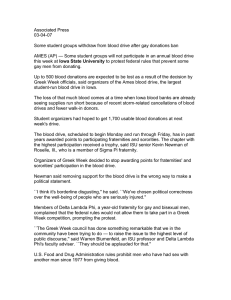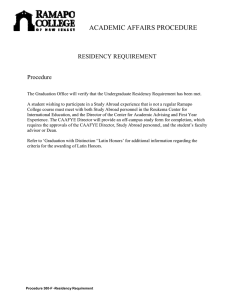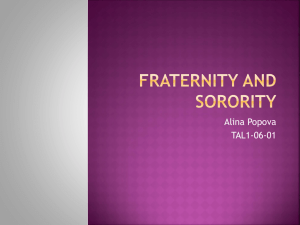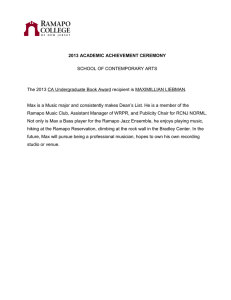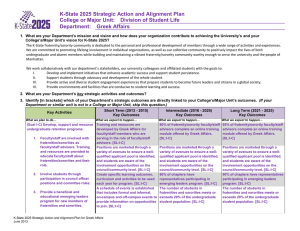Oct. 21 , 2009 Faculty Assembly Executive Council (FAEC) Meeting
advertisement
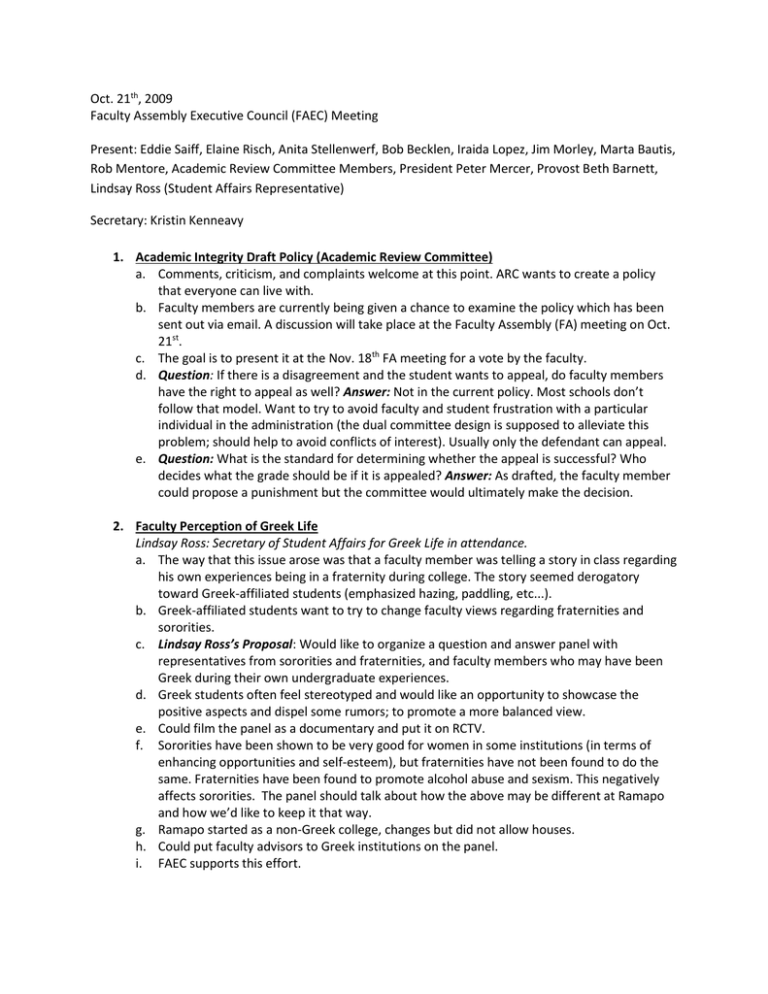
Oct. 21th, 2009 Faculty Assembly Executive Council (FAEC) Meeting Present: Eddie Saiff, Elaine Risch, Anita Stellenwerf, Bob Becklen, Iraida Lopez, Jim Morley, Marta Bautis, Rob Mentore, Academic Review Committee Members, President Peter Mercer, Provost Beth Barnett, Lindsay Ross (Student Affairs Representative) Secretary: Kristin Kenneavy 1. Academic Integrity Draft Policy (Academic Review Committee) a. Comments, criticism, and complaints welcome at this point. ARC wants to create a policy that everyone can live with. b. Faculty members are currently being given a chance to examine the policy which has been sent out via email. A discussion will take place at the Faculty Assembly (FA) meeting on Oct. 21st. c. The goal is to present it at the Nov. 18th FA meeting for a vote by the faculty. d. Question: If there is a disagreement and the student wants to appeal, do faculty members have the right to appeal as well? Answer: Not in the current policy. Most schools don’t follow that model. Want to try to avoid faculty and student frustration with a particular individual in the administration (the dual committee design is supposed to alleviate this problem; should help to avoid conflicts of interest). Usually only the defendant can appeal. e. Question: What is the standard for determining whether the appeal is successful? Who decides what the grade should be if it is appealed? Answer: As drafted, the faculty member could propose a punishment but the committee would ultimately make the decision. 2. Faculty Perception of Greek Life Lindsay Ross: Secretary of Student Affairs for Greek Life in attendance. a. The way that this issue arose was that a faculty member was telling a story in class regarding his own experiences being in a fraternity during college. The story seemed derogatory toward Greek-affiliated students (emphasized hazing, paddling, etc...). b. Greek-affiliated students want to try to change faculty views regarding fraternities and sororities. c. Lindsay Ross’s Proposal: Would like to organize a question and answer panel with representatives from sororities and fraternities, and faculty members who may have been Greek during their own undergraduate experiences. d. Greek students often feel stereotyped and would like an opportunity to showcase the positive aspects and dispel some rumors; to promote a more balanced view. e. Could film the panel as a documentary and put it on RCTV. f. Sororities have been shown to be very good for women in some institutions (in terms of enhancing opportunities and self-esteem), but fraternities have not been found to do the same. Fraternities have been found to promote alcohol abuse and sexism. This negatively affects sororities. The panel should talk about how the above may be different at Ramapo and how we’d like to keep it that way. g. Ramapo started as a non-Greek college, changes but did not allow houses. h. Could put faculty advisors to Greek institutions on the panel. i. FAEC supports this effort. 3. Faculty “Dining Area” a. A faculty-only dining space has not received universal support. One piece of feedback is that it represents discrimination against staff members. This controversy might take energy out of the initiative. b. The President’s view was that his statement responded to the faculty’s need to establish more camaraderie. He didn’t want to create controversy, but saw the need for this space as stemming from a difference in working conditions between faculty and staff. The President is willing to retract the “faculty only” aspect of it. c. The faculty-only aspect isn’t “discrimination”, but people do not like hierarchy or the creation of a group of “second class citizens”. The needs are different for faculty and staff, but people reject that argument. It was suggested that people have had a very emotional response to this issue because Ramapo has been historically rooted in an egalitarian tradition. d. Some types of staff are very involved in teaching and research (e.g. OSS, advising) so why should they be excluded? No one is going to check IDs at the door. e. Could an academic lounge be proposed instead of a lunch room? Perhaps people were offended by the idea of one group not appearing willing to “eat” with another. f. Some staff members have asked why the FRC is not being used for this purpose. Could move the Faculty Resource center to a larger space and make it multi-purpose, with a focus on academics. g. The current lunch hour is very short – people will not come if there isn’t a change in the schedule. h. Watering down the idea of the space so that it is for everyone will probably create a situation where no one will actually use it. i. Perhaps the space should be defined in terms of its purpose rather than who is might meet there. Dining may be incidental to this discussion. Assigned space for faculty to congregate is the actual idea. The key issue is the “community building” aspect of it. The point of this was to foster community – but this is actually creating divisions. j. Ideas for what to do: could discuss at a Faculty Assembly meeting (this is about academic discussion and therefore could be considered a FA matter), could have an Open Forum, or could table the issue entirely. k. President plans to make a statement regarding this matter in the next week or so. 4. Roukema Center for International Education Advisory Board(s) Proposal a. Jeremy Gellar, Director of International Education is proposing three new advisory boards to replace the current “pillar committee” on international education. b. The new structure would be comprised of a “Super Committee” and two sub-committees; one for study abroad and one for study abroad scholarships. c. Why is the existing committee being disbanded? It remained convened after the switch to the Curriculum Enhancement Plan in order to write a manual regarding study abroad, but that task is completed. d. The soon to be disbanded committee recommended changes in the document, including language that indicates that he would have authority over who served on the advisory boards. e. The International Education Program is fully staffed at this time (it has not been in the past). f. FAEC has been advised but otherwise won’t get involved. g. ARC approves study abroad proposals. 5. Academic Schedule a. FAEC Unit representative will talk to units about the academic schedule in council meetings today (Oct. 21st). b. In Communication Arts there has been quite a bit of discussion. Emails with comments about the current schedule are being compiled; these contain pros and cons about extension of the winter break. c. Note: No one is talking about changing this year’s winter break (2009/2010). d. The overlap this year is an anomaly, this shouldn’t happen for another six years. e. Participation in teaching a winter course is entirely voluntary. f. Study Abroad: Could have students do some assignments prior to actually traveling during the winter break. The cost of travel is also very high during the holidays. 6. Holiday Party: We have reserved 2 rooms in the Pavilion on Dec 9th from 12 to 5 pm. 7. Curriculum Enhancement Plan (CEP) Provost Beth Barnett a. The CEP is being reviewed - it was meant to increase rigor but the students report that this is not happening. b. Not all students are being challenged to the extent that some of them want them to be. c. Should have a discussion about this at some point.

